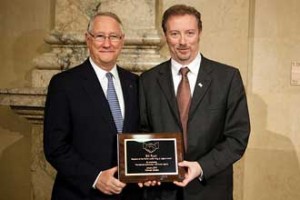
School of Social Work’s Bill Ryan receives Martin Luther King Legacy Award for community service
By Pascal Zamprelli
About two weeks ago, Professor Bill Ryan of McGill’s School of Social Work received a phone call that left him “shocked, in the good sense, and surprised. More than anything else,” he added, “I was moved.”
The call was to let him know he would be one of this year’s recipients of the Martin Luther King Jr. Legacy Award for outstanding community service. And on Jan. 25 (Martin Luther King Day in the United States), Ryan received his award at City Hall from Montreal Mayor Gérald Tremblay.
Originally from Moncton, N.B., Ryan came to Montreal in the late ’80s and has been at McGill, in various capacities, since 1991. He now teaches in the School of Social Work, where he has helped develop a gender and sexual diversity minor program. His “still developing field” of expertise includes sexuality, homophobia and human rights, as well as issues such as HIV prevention, gay men’s health, and helping young people deal with coming out.
“We look at the history of homophobia and its impact on the lives of people still today,” both psychologically and socially. “People may have full human rights but that doesn’t mean that they actually can exercise those rights or that those rights are respected everywhere,” he said. Noting that while gays have acquired full equality in the eyes of Canadian law, he said, there is much work left to do here from a social perspective, as well as from a legal perspective in other parts of the world.
But much of the work that earned Ryan this impressive recognition occurred outside the classroom, including most notably a number of services he has developed. About 20 years ago, he founded Project 10, an outreach organization providing support services to gay, lesbian, bisexual and transgender youth between the ages of 14 and 25, at the youth and family centre where he was employed at the time. A few years after founding it, Health Canada asked Ryan if he would take that model and develop it in other cities across Canada. Today, known as Safe Spaces, it is one of the largest organizations of its kind in
the country.
“The Safe Spaces project was aimed at implementing services for sexual minority youth in smaller cities across the country that didn’t have already active organizations, and providing supportive services to youth to keep them in school, to keep them healthy, and to keep them thinking more positively about themselves,” Ryan said. “We tested it with research, and that became a model for the development of dozens and dozens of organizations across the country.”
That research involved the first large scale Canadian study ever conducted looking at the impact of services for gay and lesbian youth, and what factors helped them the most to adapt in a healthy way to their emerging sexual orientation. Until that time, Ryan explained, Canadian social workers and educators had only American data to work with. Through their research, Ryan and his team found that three factors in a young person’s life – social support, access to more positive images of homosexuality, and a peer group in which they could discuss and manage some of these issues – were instrumental in ensuring a healthy development. “When these three things were there for them in their environments, they went through the coming out process in a relatively short period of time and ended up coming out of it pretty intact,” he said.
While Ryan has received awards from the gay and lesbian community for his work, and he is very grateful for that recognition as well, he feels there is something particularly special about receiving an award
associated with Dr. King, because it stresses the parallels between homophobia and other human-rights issues such as racism.
“It shows the interconnections between various forms of discrimination, which for me has always been extremely important. Because racism and homophobia come from the same place, and recognizing that is really important,” Ryan said. “For me, working against homophobia has also meant for me working against racism and sexism, because I believe they’re intimately connected. So the fact that an association aligned with the name of Martin Luther King would recognize my work is absolutely phenomenal. It’s just thrilling, and it’s quite humbling.”
